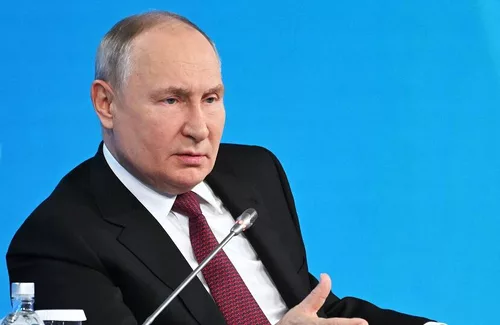Russian President Vladimir Putin’s adversaries have met violent deaths during his time in power, a media report said. Alexei Navalny’s death, which many foreign leaders and supporters believe to be murder, occurred after he was banished to an Arctic Circle prison, where he was mistreated. Putin’s other foes have faced shootings, poisonings, and even a plane crash, with many of the deaths remaining unsolved. Former members of the Russian intelligence services who defected to the West have also been targeted in poisonings.
Putin’s dark methods first became known during the case of Alexander Litvinenko, a former member of the FSB security services who had become an opponent of Putin and died of polonium-210 poisoning in London in 2006. The former head of the Wagner paramilitary group arrived in Moscow for talks with Putin after an aborted mutiny but died in an explosion aboard his plane. Other prominent critics of Putin, such as Boris Nemtsov, Anna Politkovskaya, and Boris Berezovsky, have also met mysterious deaths under circumstances that raise questions.
The pattern of violent deaths among Putin’s adversaries raises concerns about the lengths to which the Kremlin leader and his regime are willing to go to silence opposition. The unsolved nature of many of these deaths has led to suggestions of direct involvement from the Kremlin, further deepening the mystery and raising questions about the rule of law and accountability in Russia.
The international community, including many foreign leaders and supporters, continues to call for a full and transparent investigation into these deaths, seeking justice for the victims and their families. The ongoing pattern of violence against dissent in Russia remains a topic of concern and scrutiny for the global community, as the world watches to see how these events will shape the country’s future and its relationship with the rest of the world.

 Jasmine Crockett Net Worth 2024: How Much is the United States Representative Worth?
Jasmine Crockett Net Worth 2024: How Much is the United States Representative Worth? New COVID-19 Variant Alert! KP.2 Can Bypass Your Immunity—How You Can Protect Yourself, Learn Everything
New COVID-19 Variant Alert! KP.2 Can Bypass Your Immunity—How You Can Protect Yourself, Learn Everything #Blockout2024: Why are A-Grade Celebrities Being Blocked And Reported On Social Media?
#Blockout2024: Why are A-Grade Celebrities Being Blocked And Reported On Social Media? Burnsview Secondary School Placed Under Lockdown For Prank Call, Investigation Underway
Burnsview Secondary School Placed Under Lockdown For Prank Call, Investigation Underway  Flagstaff Shooting At Bushmaster Park In Arizona, Armed and Dangerous Suspect Arrested
Flagstaff Shooting At Bushmaster Park In Arizona, Armed and Dangerous Suspect Arrested Lawsuit Slapped Against Chicago-Area Teacher And High School For Childhood Sexual Abuse
Lawsuit Slapped Against Chicago-Area Teacher And High School For Childhood Sexual Abuse 10 YO Sammy Teusch from Indiana Killed Himself After Relentless Bullying At School
10 YO Sammy Teusch from Indiana Killed Himself After Relentless Bullying At School Taxi Drivers Welcome Ruling That Found City Of Ottawa Negligent In Allowing Uber To Operate
Taxi Drivers Welcome Ruling That Found City Of Ottawa Negligent In Allowing Uber To Operate